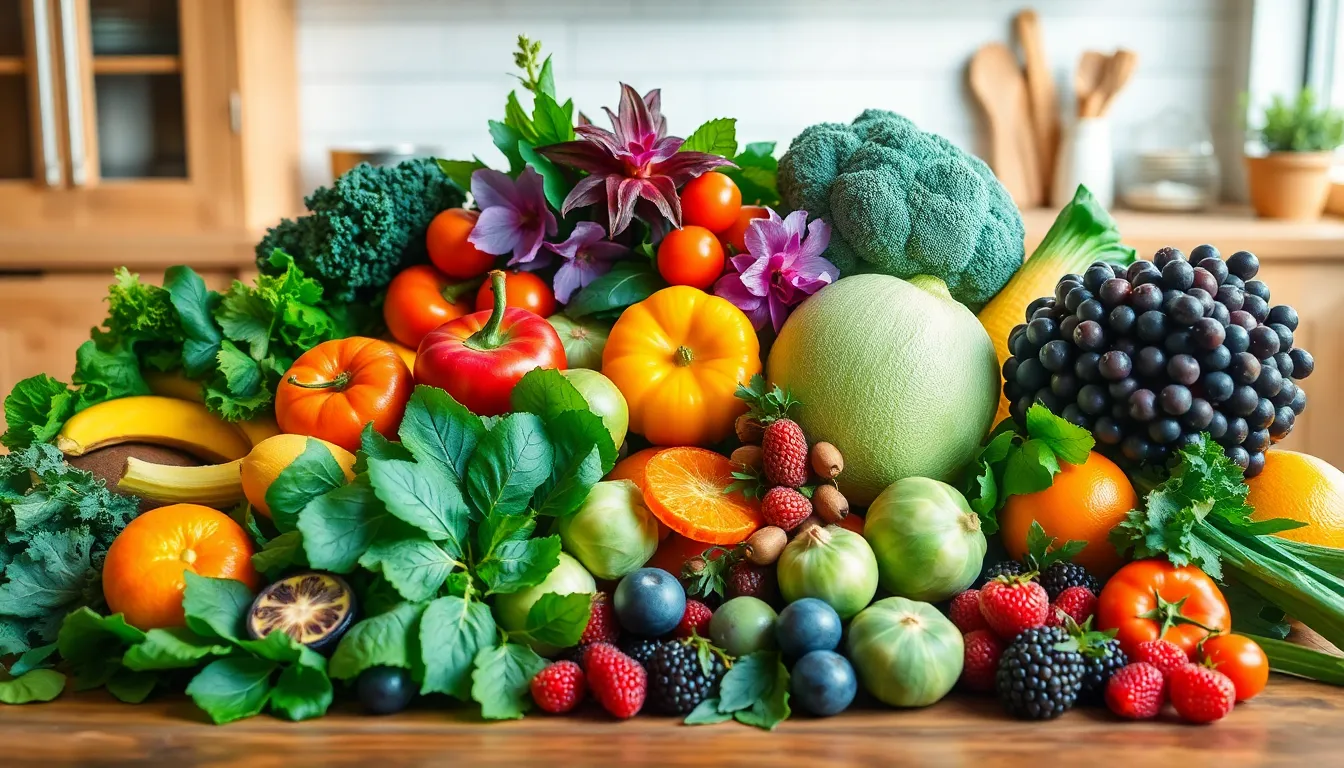
What Food Is Good for the Liver? Discover the Best Choices for Optimal Health
The liver might not get the spotlight it deserves, but it’s the unsung hero of the body, working tirelessly to detoxify and keep everything running smoothly. Yet, many people overlook the importance of what they put on their plates. If the liver had a wishlist, it would be packed with delicious foods that support its health and function.
What Food Is Good for the Liver
Liver health plays a vital role in overall well-being. This organ filters toxins, processes nutrients, and produces bile, which aids in digestion. Regularly consuming certain foods can significantly enhance liver function and promote detoxification.
Leafy greens, such as spinach and kale, contribute essential vitamins and minerals. They also contain compounds that assist in removing toxins from the bloodstream. Cruciferous vegetables like broccoli and Brussels sprouts provide antioxidants that protect liver cells from damage.
Healthy fats, particularly omega-3 fatty acids found in fish and walnuts, support liver health by reducing inflammation and fat buildup. Antioxidant-rich fruits, such as berries and citrus, also play an important role in detoxification and provide nutrients essential for liver recovery.
Incorporating whole grains such as oats and quinoa into the diet offers additional benefits. These foods help regulate blood sugar levels and provide fiber that supports digestive health. Drinking plenty of water remains crucial for maintaining hydration, which allows the liver to function optimally.
Spices like turmeric and garlic deserve attention as well. Turmeric contains curcumin, known for its anti-inflammatory properties and ability to stimulate bile production. Garlic aids in activating liver enzymes responsible for flushing out toxins.
Regularly consuming a balanced diet rich in these foods promotes liver health. Prioritizing fresh, whole foods can help in achieving optimal liver function and overall wellness.
Benefits of a Healthy Liver

A healthy liver contributes significantly to overall well-being. It detoxifies harmful substances, regulates blood sugar levels, and aids in nutrient absorption.
Role of the Liver in the Body
The liver performs essential functions that sustain life. It filters toxins from the bloodstream, ensuring their removal from the body. Nutrient processing occurs in the liver, converting food into energy. Bile production, also handled by the liver, promotes fat digestion and absorption. This organ synthesizes proteins vital for blood clotting and other bodily functions. Maintaining liver health, therefore, affects metabolic processes and overall health.
Common Liver Issues
Liver issues can arise due to various factors, including diet, genetics, and lifestyle. Fatty liver disease, for instance, stems from excess fat accumulation, often related to obesity and poor eating habits. Hepatitis, an inflammation of the liver, can result from viral infections or excessive alcohol consumption. Cirrhosis develops as a consequence of chronic liver damage, impacting its ability to function properly. Early detection and management of these conditions is crucial for restoring liver health and preventing further complications.
Foods That Support Liver Function
A balanced diet featuring specific foods significantly enhances liver health. These foods offer nutrients that help the liver detoxify effectively.
Leafy Greens and Cruciferous Vegetables
Leafy greens such as spinach and kale contain high levels of chlorophyll. Chlorophyll aids in flushing toxins from the bloodstream. Cruciferous vegetables like broccoli and Brussels sprouts boast sulforaphane, which supports liver enzyme production. Fiber from these vegetables promotes digestive health, contributing to better liver function. Consuming these types of vegetables regularly can lead to improved detoxification and overall well-being.
Fruits Rich in Antioxidants
Berries, including blueberries and strawberries, provide essential antioxidants that combat oxidative stress. Citrus fruits such as oranges and lemons enhance liver health through their high vitamin C content. These fruits also contribute to increased hydration, which is vital for liver function. Antioxidants neutralize free radicals, reducing inflammation in the liver. Including a variety of these fruits in the diet supports liver health and promotes effective detoxification.
Healthy Fats and Proteins
Healthy fats from sources like fish and walnuts deliver omega-3 fatty acids that reduce liver fat levels. Including nuts and seeds provides essential nutrients that support cellular health. Protein sources such as lean meats and legumes assist in tissue repair and overall liver function. These proteins contribute to the liver’s role in synthesizing enzymes necessary for optimal metabolism. Benefits arise from consuming a diet rich in these healthy fats and proteins, leading to improved liver health and function.
Lifestyle Tips for Liver Support
Supporting liver health involves a combination of hydration, exercise, and mindful eating choices.
Hydration and Alcohol Intake
Staying hydrated is essential for optimal liver function. Water helps facilitate the liver’s detoxification process by flushing out toxins. Consuming at least eight 8-ounce glasses of water daily is recommended. Alcohol consumption significantly impacts liver health, leading to conditions like fatty liver disease and cirrhosis. Limiting alcohol intake to moderate levels can mitigate these risks. Moderate drinking typically means no more than one drink per day for women and two for men. Incorporating non-alcoholic beverages like herbal teas can further support hydration and liver function.
Regular Exercise and Weight Management
Engaging in regular physical activity promotes liver health and aids in weight management. Aim for at least 150 minutes of moderate exercise weekly to help maintain a healthy weight. Weight control is vital as obesity contributes to fatty liver disease. Reducing excess body fat can support liver repair and function. Activities like brisk walking, swimming, and cycling can be beneficial. Strength training also enhances muscle mass, which boosts metabolism. Prioritizing a balanced routine of exercise helps the liver process nutrients more effectively and reduce fat accumulation.
Conclusion
Maintaining liver health is essential for overall well-being. By incorporating liver-friendly foods into daily meals, individuals can significantly enhance their liver function and support its vital processes. A balanced diet rich in leafy greens, cruciferous vegetables, healthy fats, and antioxidant-rich fruits plays a crucial role in detoxification and nutrient processing.
In addition to dietary choices, adopting a healthy lifestyle that includes regular exercise and proper hydration further promotes liver health. By prioritizing these practices, individuals can take proactive steps toward preventing liver-related issues and ensuring their liver remains resilient and efficient. Embracing a holistic approach to liver care is key to fostering long-term wellness.



